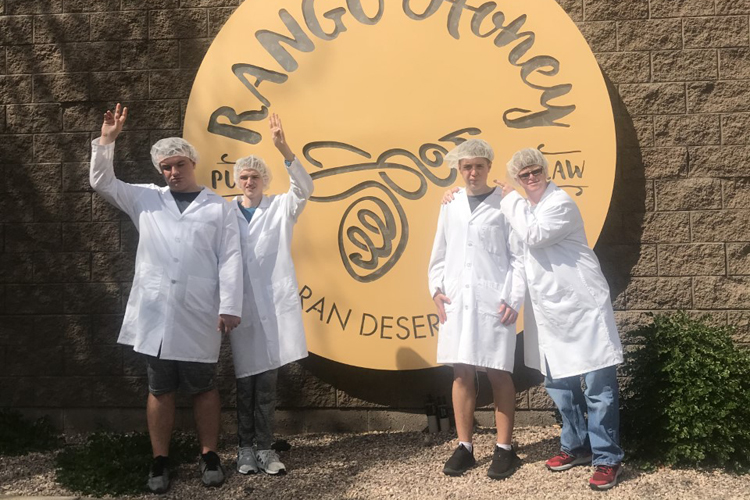There’s a positive buzz surrounding Rango Honey, a Tempe-based business established in 2016 that gives back to the community in more ways than one.
Since business partners Karen Greenstein and Tim Rosengren founded Rango Honey in 2016, it has become a local favorite. The kosher, SQF Certified business creates 100 percent pure, raw honey, straight from the Sonoran desert.
Rosengren’s son, who has Autism, inspired them to start the business and establish Neshama, an assisted living community for people with autism. Those who live in Neshama have an opportunity to train and work at Rango Honey.
We spoke with co-founder and owner Karen Greenstein, Heather Blackford, operations manager of Rango Honey and Laura Jandl, executive director of Neshama to discuss Rango Honey’s success, the rewarding part of giving back and the bright future ahead.
Az Big Media: What inspired you to create Rango Honey?
Karen Greenstein: The need for pure, unadulterated honey was evident because it’s very hard to find pure honey and honey that doesn’t have all kinds of additives to it. And then having a family member who is autistic really gave us the passion to create this honey that is 100 percent pure and unadulterated in the hopes to support independent living services and job training for adults with disabilities.
ABM: How has Rango Honey grown since 2016 and what kinds of unique products do you offer?
KG: We started with one beehive and we grew that up to more than 1500 hives creating four different types of honey: Clover Alfalfa, Desert Bloom, Mesquite Honey, and Orange Blossom.
Our Clover Alfalfa is the honey that I would say most of our customers relate to; 80 percent of U.S. honey is either clover or alfalfa, ours just happens to be Arizona alfalfa honey, so that one is very traditional.
Our Desert Bloom, the hives are in the desert so the bees are feeding on anything and everything flowering: cacti, desert sage, cottonwood. So it’s very fragrant, floral and sweet honey.
Our Mesquite Honey- mesquite trees are very indigenous here in Arizona, they’re everywhere. They have a smoky fragrance to them, that’s very much how the mesquite honey is, it’s thick, it’s creamy, it’s almost like a soft caramel with a bit of a smoky flavor.
Our Orange Blossom has a hint of citrus; our bees feed from white blossoms of orange tree groves.

ABM: Can you tell me more about Neshama, the assisted living community for adults with Autism and how Rango supports it?
Laura Jandl: Rango Honey also has a group home called Neshama, and all the profits from Rango Honey go back into Neshama to support adults with autism and disabilities to have independent living services be provided and to provide on the job training at Rango.
We weren’t seeing a lot of programs or group homes out there that we were impressed with, so we wanted to create even more opportunities for adults in the community with disabilities to have a valued, safe work environment to come to every day. Tim (one of Rango Honey’s co-founders) wanted to make sure his son had a welcoming, nurturing work environment to come to every day.
We partnered with Scottsdale Unified School District and we have students that come down four days a week to do some on the job training and to learn some hands-on skills in the honey production process and it’s been amazing to watch everybody’s skills grow each day.
It started really small, we were just doing labels and boxes, and now the kids are putting the honey in the jars and using the laser on the bottom and labeling, so they’re really growing. It’s purposeful work that they can see the results of right away.
KG: It’s been super great to see the impact it has had on each of these young adults and their self-confidence, this gives them meaning, this gives them focus, this gives them something to be proud of.
ABM: What has been the most rewarding aspect of the business?
LJ: I think the most rewarding piece has been just reaching out to families and seeing how proud they are of their own children when they come down and see them working and seeing how proud these students are of themselves and with the home, each individual who lives in the home will also have an opportunity to have a valued role down here at Rango Honey and building a community that provides opportunities for this population of people has been so important and so awesome to connect with.
Heather Blackford: I myself have found this incredibly enriching and we’re all very passionate about it. These young adults who are getting vocational training from us, it feels like they’re giving back more to us than we are doing for them, which is heartwarming to say the least. It’s been great working with the parent educators as well as the students and seeing their growth and how excited they are to be here. It’s been amazing meeting community members and people who are affected with disabilities and how supportive we all are as a tight-knit community and promoting understanding, knowledge, and acceptance.
ABM: What has the customer reception been like for locals and visitors?
HB: It’s been very good and supportive. There’s not a whole lot of services available for these students with disabilities and their caretakers, so the more we can talk about it, the better we feel about it.
Another thing we find very enriching, of what we’re doing at Rango Honey, is we’re educating our consumers and the community about the benefits of raw honey. Honey has many purposes, obviously, it’s edible, but it also has medicinal properties as well, local honey is known to help with allergies; it’s an antifungal, anti-microbial product, so it helps with wounds, it’s also anti-inflammatory, so it’s great at helping with internal inflammation, just by ingesting it.
ABM: What do you hope Rango Honey’s legacy will be?
HB: We absolutely are supportive of other businesses and hope to be a role model for other businesses, and hope that we help inspire other businesses and community members to be active and supportive and embracing and of course the best way to support our mission is to buy Rango Honey.




